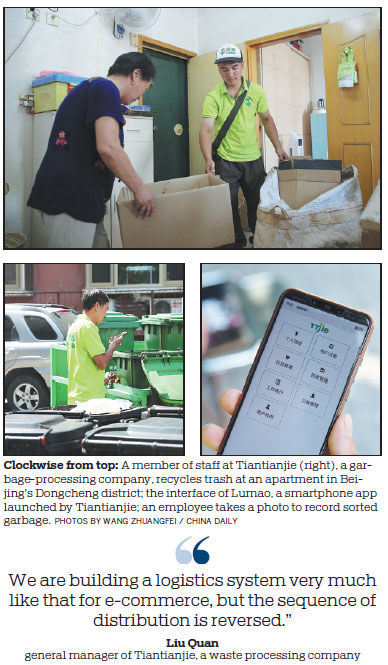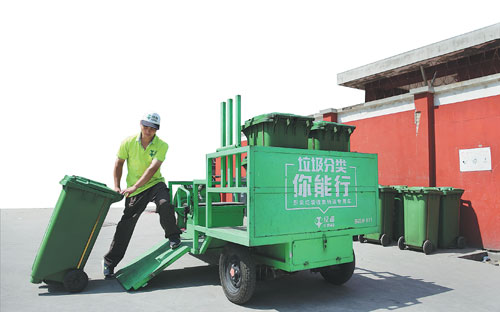Technology helps to clean up a dirty business
Mobile apps are making garbage collection more efficient and eco-friendly. Hou Liqiang reports.
Editor's note: In the wake of new regulations to encourage trash sorting across Shanghai, this is the first of two stories focusing on the central government's efforts to introduce the practice in Beijing, before expanding it to other cities around the country.
Lin Ming used to spend most of his working day riding a tricycle through Beijing's streets and alleys, bellowing "waste collection" at intervals. He described himself as a "guerrilla", who often played cat-and-mouse with urban patrol officers known as chengguan.
In 1997, the junior high school dropout joined his father in the capital to work as a junkman. The then-13-year-old had to try his best to avoid the chengguan, who impounded the garbage-packed tricycles of waste collectors like him, citing the fact that their activities were unlicensed and that the piles of trash they collected adversely affected the city's appearance.

However, Lin's cat-and-mouse working methods have been consigned to history since he became "incorporated into the regular collection army" by joining Tiantianjie, a garbage-recycling company. The veteran still collects waste, but instead of hawking for trade, business is just a click away.
Holding his smartphone, the 35-year-old waits for orders from an app called Lumao, literally "green cat", launched by Tiantianjie in 2015.
Residents of Donghuashi, a street in Beijing's Dongcheng district, and nearby Temple of Heaven Street can use the app to call the company's employees simply by clicking a button on their phone.
The central government is making unprecedented efforts to promote garbage sorting, but that has had the unforeseen result of social media platforms being inundated with people complaining about the difficulty of identifying the categories various types of waste fall into.
In response, companies such as Tiantianjie are offering viable internet-based solutions that are moving garbage-sorting programs forward by saving residents the trouble of sorting garbage themselves, and thus encouraging their future participation.
The onus on residents has been greatly reduced, because after selling their recyclable waste to companies such as Taitianjie they only have to dump their kitchen leftovers in specially designated trash cans, while other waste goes into specific bins in the community.
Pilot programs
Beijing has been piloting garbage sorting since 2000, but has yet to see marked progress.
Liu Quan, Tiantianjie's general manager who has worked in the garbage-recycling industry since 2005, said the capital's previous efforts failed mainly because there was no monitoring system to assess progress and officials failed to identify the core necessities of trash-sorting programs.
In 2000, the government hired garbage-sorting "instructors", who worked at dumping sites in communities helping residents to dispose of different types of trash correctly. However, authorities found it difficult to supervise their work, and when officials conducted inspections, they mainly checked to see if the facilities were orderly and there were clear identifiers to facilitate the disposal of sorted trash.
Moreover, the volume of sorted trash, which should have been a key factor in the assessment program, was not included in the inspectors' lists, Liu said.
Now, the internet is addressing many of those problems via garbage-sorting databases, which allow the volume of sorted waste to be assessed efficiently and help people to realize that their efforts are not in vain, he added.
Liu said too much attention has been paid to the "front-end" of the garbage-dumping process. For example, many communities have introduced smart facilities which can only be opened when residents scan QR codes with their smartphones, while others have even built attractive facilities to serve as dumping sites. However, irrespective of their appearance, they still only house garbage bins.
"Garbage sorting requires a complex network that goes far beyond these simple measures - an efficient logistics system is key because the garbage needs to be transported after being sorted," he said.
However, China's high population density means it is difficult to establish such logistics systems. Garbage bins in communities can fill up quickly and it can be difficult to transport the trash promptly.
Ironically, according to Liu, those factors are advantageous for his company. He said the government pays Tiantianjie to separate waste which has been deposited haphazardly in green trash cans - intended purely for kitchen leftovers - in Donghuashi and Temple of Heaven streets, which are home to about 46,000 households.
Redeemable credit
The company's employees deal with kitchen waste in the morning, and in the afternoon they provide a free, additional service by collecting recyclable garbage from residents, who receive money in their Lumao account depending on the amount of sorted garbage they hand over.
The company has built a transfer station for every 1,500 to 2,000 households to accommodate garbage collected by employees such as Lin. Later, small trucks carry the trash to Tiantianjie's centers, where it is further sorted and packed before being sent to processors, Liu said.
"We are building a logistics system very much like that for e-commerce, but the sequence of distribution is reversed," he added.
In addition to the credit sent to residents' Lumao accounts from "selling" recyclable trash, which they can use to purchase goods from online stores operated by the app, they can enter a daily lucky draw by uploading photos of correctly sorted kitchen waste. The winner can collect one to 28 Lumao "coins", which can also be exchanged for goods via the app.
Donghuashi resident Ju Yueru has found using the app interesting, and she uploads photos to the platform every day.
On July 12, the 70-something sold 31 plastic bottles, five beverage cans and 6 kilograms of cardboard via Lumao for 8 yuan ($1.2). However, she said she may never use the money or the Lumao coins in her account.
"I don't care so much about the returns, but it's a good way to prove that I sort my trash," she said with a laugh, adding that she has been promoting the app among friends in her community.
Liu said Tiantianjie can handle 2,000 metric tons of kitchen waste and collect 4,000 to 5,000 tons of recyclable waste annually, but noted that the company doesn't collect all types of recyclable garbage. For example, it doesn't take glass or toys made from certain types of plastic.
The company is looking to expand its model, and though it is still losing a small amount of money every year, business will become more profitable and sustainable as the scale increases.
Meanwhile, in the capital's Changping district, AiFenLei, another garbage-recycling company, is using the internet to promote trash sorting via a similar model to that used by Tiantianjie. What makes AiFenLei different is that it collects all kinds of recyclable garbage, and instead of offering different prices for different kinds, it offers 0.8 yuan for every kilogram it collects.
Launched in 2017, the company uses miniprograms on WeChat to solicit business from 130,000 households in Changping, and also deals with phone orders.
Xu Yuanhong, AiFenLei's general manager, said the company loses money when it collects recyclable garbage such as glass, which it sells to processors for just 0.2 yuan per kg. However, it will continue to accept all sorts of recyclable trash because "our aim is to help the government address challenges in garbage reduction and recycling".
The operating costs for garbage sorting would be high if the government wanted to do everything itself, and it would be hard to make it sustainable by offering subsidies, added Xu, whose family has been dealing with garbage since the 1990s.
"We are trying to use a market-oriented mechanism to solve these problems," he added.
As a social service offered to the local government, AiFenLei sends pure kitchen waste to the processors, earning about 120 yuan per annum for every household in the areas it serves. The company can also make about 200 yuan from each of the more than 30 tons of recyclable waste it collects from the residents every day, Xu said.
Improved efficiency
Compared with traditional garbage collection methods, which depended on "guerrilla" collectors touting for business, internet-facilitated services have greatly improved efficiency.
Before, garbage had to be traded four to five times before it reached the processors, but by using the company's latest model, the trash goes to the processors directly after it is collected, Xu said.
AiFenLei's 60 collectors can each deal with 30 to 50 orders a day. Their efficiency will improve as the number of orders rises, because the higher the number of sellers, the more concentrated they will be in certain areas, meaning collectors will spend less time traveling, he added.
He also plans to incorporate more services into the company's business.
For example, garbage collectors currently set out empty-handed, but in the future they may use their outbound journeys to deliver items that residents along the route have bought online.
A change in the frequency of orders from seniors, which is easy to calculate via the internet platform, could also alert the company that they may have suffered an accident.
Moreover, the collection agents may build time into their journey to chat with older residents, providing companionship for seniors who spend a lot of time on their own.
"We want to develop the company into one that improves public welfare. However, we will not be like traditional NGOs that rely on the government purchasing their services. We want to make profits, because they are the lifeblood that will allow us to sustain ourselves," Xu said.
Contact the writer at houliqiang@chinadaily.com.cn
|
A Tiantianjie employee drags a trash can onto a cart in a Beijing district earlier this month.Wang Zhuangfei/china Daily |
(China Daily Global 07/31/2019 page5)



















